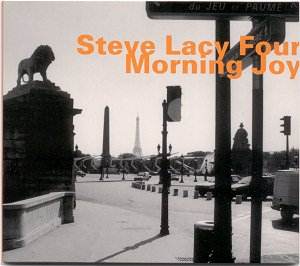STEVE LACY FOUR
Morning Joy
 hatOLOGY
556
hatOLOGY
556
Crotchet

When hatART deleted their entire '6000 series', a lot of great music (by
Cecil Taylor, Vienna Art Orchestra, and Anthony Braxton, among many others)
became "unavailable for the foreseeable future". The Steve Lacy discography
was particularly badly hit, with excellent albums like "Futurities", "Songs",
"Itinerary", "Flim-flam" and "Clangs" all disappearing. Most mourned of all
were two classic Lacy albums, "School Days" and "Morning Joy". So it is a
great pleasure to welcome this reissue of hatART 6014 (plus an extra track).
Recorded live at the Sunset Club in Paris, in February 1986, the album features
Lacy (as ever) on soprano sax, with Steve Potts on alto and soprano saxes,
Jean-Jacques Avenel on bass and Oliver Johnson on drums. This pared-down
version of the Lacy sextet - minus pianist Bobby Few and Irène Aëbi
on cello and vocals - has a directness and focus that the full group can
sometimes lack. (Aëbi, in particular, contributes a detached, cerebral
dimension to the sextet that can be rather passionless.)
It is especially pleasing that the focus here is primarily on Lacy and Potts.
Potts is one of the great unsung heroes of recent jazz history. With Lacy
for over a quarter of a century, he has contributed immeasurably to the sound
and warmth of Lacy's music. His tone is fuller and earthier than Lacy's,
making him the perfect foil to the leader. There is rarely any difficulty
telling the two apart, even in their most labyrinthine playing. Here, the
two of them give a tour-de-force performance, weaving saxophone lines
around each other and trading phrases and solos throughout.
As on so many of Lacy's best albums, the material is divided between Lacy
originals and Thelonious Monk compositions. In the mid-80s, after a decade
during which he mainly played his own compositions, Lacy started to re-explore
Monk, a process that continues unabated today. (Ultimately, it is his relentless
exploration of Monk's music that may be judged as Lacy's finest achievement.)
Throughout this recording, the playing has an enthusiasm to it that is only
partly explained by the energising effects of the live setting and the
appreciative audience. The players also sound as if they are relishing playing
the material.
As much as I love Lacy solo, or his duets with Mal Waldron, I would award
this quartet pride of place. It is impossible to fault this album for atmosphere,
passion or sheer musicality. This reissue consists of 3000 copies. Be careful
not to miss out!
John Eyles